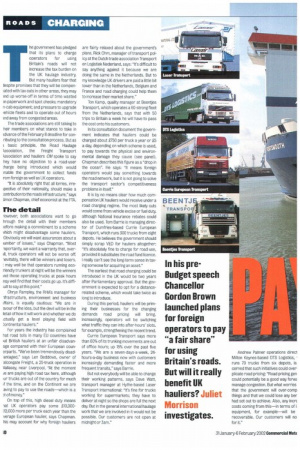T he government has pledged that its plans to charge operators
Page 40

If you've noticed an error in this article please click here to report it so we can fix it.
for using Britain's roads will not increase the tax burden on the UK haulage industry. But many hauliers fear that iespite promises that they will be compeniated with tax cuts in other areas, they may ind up worse-off in terms of time wasted in paperwork and spot checks; mandatory n-cab equipment; and pressure to upgrade rehicle fleets and to operate out of hours Ind away from congested areas.
The trade associations are still talking to heir members on what stance to take in tdvance of the February 8 deadline for conributing to the consultation process. But as I basic principle, the Road Haulage ‘ssociation, the Freight Transport kssociation and hauliers CM spoke to say hey have no objection to a road-user :harge being introduced which would mable the government to collect funds rem foreign as well as UK operators.
"it is absolutely right that all lorries, irrepective of their nationality should make a :ontribution to the roads infrastructure," says 3imon Chapman, chief economist at the FTA.
The detail
1owever, both associations want to go hrough the detail with their members *fore making a commitment to a scheme vhich might disadvantage some haulier& Obviously we will want assurances about a lumber of issues," says Chapman. "Most Tiportantly, we want a warranty that, overill, truck operators will not be worse off ievitably, there will be winners and losers. : may well be that operators running ecoriendly trunkers at night will be the winners Ind those operating trucks at peak hours nay well find that their costs go up. It's diffi:uit to say at this point."
Chrys Rampley, the RHA's manager for ifrastructure, environment and business 'flair& is equally cautious: 'We are in avour of the idea, but the devil will be in the letail of how it will work and whether we do dually get a level playing field with ontinental hauliers."
For years the industry has complained hat road tolls in many EU countries have Jut British hauliers at an unfair disadvanage compared with their European counerparts. "We've been tremendously disadantageci," says Len Beddows, owner of alcongate Freight, a 25-truck operation in Vallasey, near Liverpool. "At the moment de are paying high road tax here, although or trucks are out of the country for much f the time, and on the Continent we are eying to pay to use the roads—which is a it of money."
On top of this, high diesel duty means iat UK operators pay some £10,00012,000 more per truck each year than the verage European haulier, says Chapman. his may account for why foreign hauliers are fairly relaxed about the government's plans. Rick Ohm, manager of transport policy at the Dutch trade association Transport en Logistiek Nederland, says: "It's difficult to say anything against it because we are doing the same in the Netherlands. But to my knowledge UK drivers are paid a little bit lower than in the Netherlands, Belgium and France and road charging could help them to increase their market share."
Ton Kamp, quality manager at Beentjes Transport, which operates a 60-strong fleet from the Netherlands, says that with 50 trips to Britain a week he will have to pass the cost onto his customers.
In its consultation document the government indicates that hauliers could be charged about £750 per truck a year or 15 a day, depending on which scheme is used, to pay towards the physical and environmental damage they cause (see panel). Chapman describes this figure as a "drop in the ocean". He says: "It means foreign operators would pay something towards the road network, but it is not going to solve the transport sector's competitiveness problems in itself."
It is by no means clear how much compensation UK hauliers would receive under a road charging regime. The most likely cuts would come from vehicle excise or fuel duty, although National Insurance rebates could also be used. Tom Barrie is managing director of Dumfries-based Currie European Transport, which runs 300 trucks from eight depots. He believes the government should simply scrap VED for hauliers altogether: "It's absolutely fine to charge for road use, provided it substitutes the road fund licence. I really can't see the long-term sense in taxing someone for acquiring an asset."
The earliest that road charging could be introduced in the UK would be two years after Parliamentary approval. But the government is expected to opt for a distancerelated scheme, which would take twice as long to introduce.
During this period, hauliers will be priming their businesses for the changing demands road pricing will bring. Increasingly, operators will be switching what traffic they can into after-hours' slots, for example, strengthening the recent trend.
Currie European Transport says more than 60% of its trunking movements are out of office hours; up 15% over the past five years. 'We are a seven-days-a-week, 24hours-a-day business now with customers increasingly demanding faster and more frequent transits," says Barrie.
But not everybody will be able to change their working patterns, says Dave Watt, transport manager at Hythe-based Laser Transport International: "It's fine for trucks working for supermarkets; they have to deliver at night so the shops are full the next day But in the general international haulage work that we are involved in it would not be possible. Our customers are not open at midnight or 3am."
















































































































































